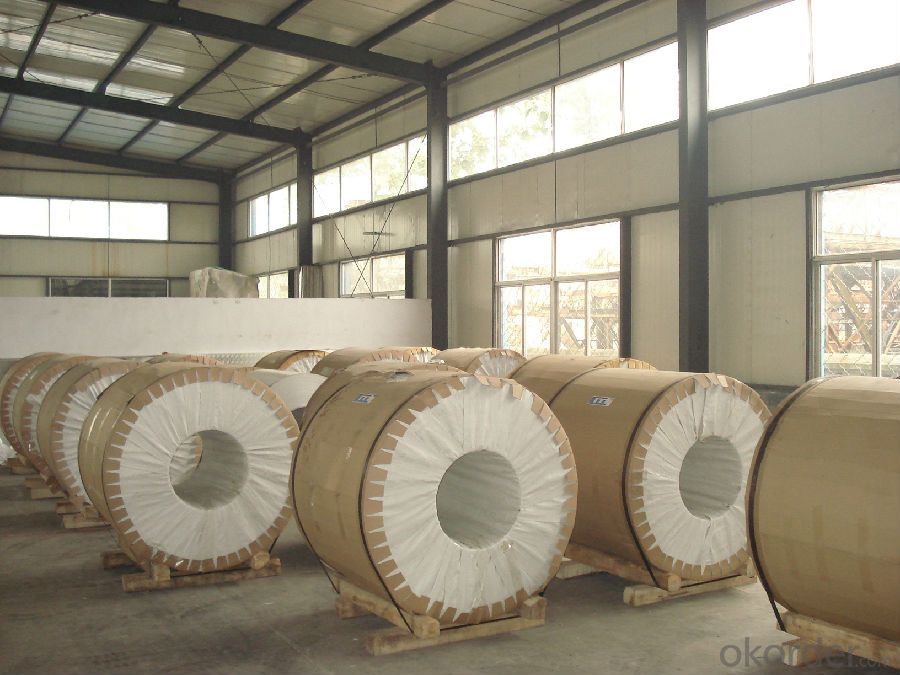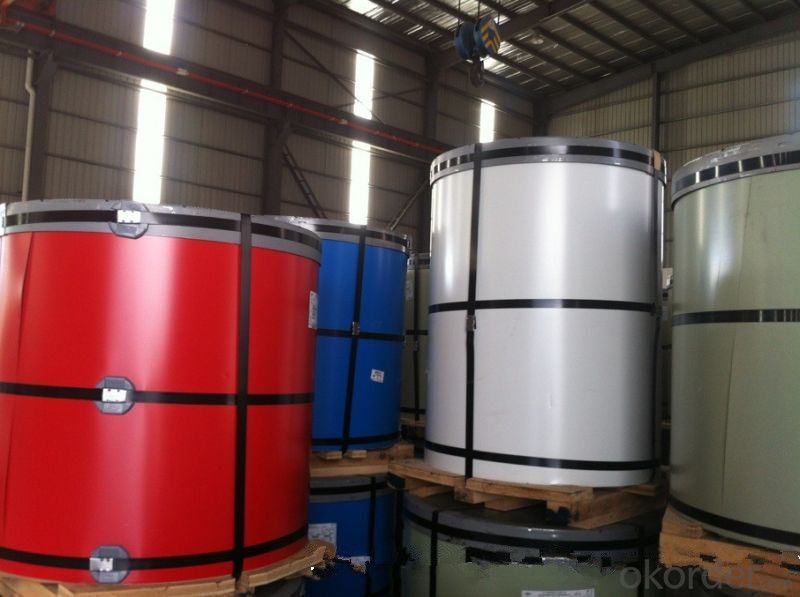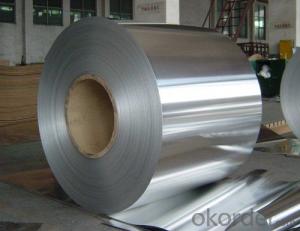PVDF Coated Aluminium Sheet For Solar Panels
- Loading Port:
- Shanghai
- Payment Terms:
- TT OR LC
- Min Order Qty:
- 1 m.t.
- Supply Capability:
- 60000 m.t./month
OKorder Service Pledge
OKorder Financial Service
You Might Also Like
Item specifice
PVDF Coated Aluminium Roll For Solar Panels
Specifications
Standard | GB/T3190-2008, GB/T3880-2006, ASTM B209, JIS H4000-2006 .etc |
Thickness | 0.2-8.0 mm aluminium 7075 t6 |
Width | 1250mm 1000mm 1219mm or as your requirements |
MOQ | 8 Ton |
Package | Standard export package, by wooden box or as required. |
Application | 1060 is widely used in the strength requirements of the product. Products commonly used in signs, billboards, building exterior decoration, bus body, high factory wall decoration, kitchen sink, lamp, fan, electronic components, chemical apparatus, sheet processing, deep drawing or spinning hollow ware, welding parts, heat exchangers, Bell surface and plate, plates, kitchen utensils, accessories, safety equipment and other. |
Characteristics
1) Excellent weather-proof durability
2) Anti-ultraviolet
3) High erosion resistance
4) Stable color and gloss
5) Good mechanical processing performance
6) Abrasion resistance
7) Anti-impact
8) High flexibility
Coating varieties
Polyester Coatings (PE)
PE (polyester) coatings exhibit an excellent combination of hardness, flexibility, flow, appearance, and superior resistance to dirt retention in indoor and outdoor applications. These coatings are highly resistant to abrasion, metal marking, staining, and marring, and require minimal maintenance. Glazetech uses polyester paints which provide excellent colour and gloss retention properties.
Polyvinylidene Fluoride Coatings (PVDF)
PVDF (polyvinylidene fluoride) is a chemical resistant thick film barrier coating commonly used in architectural applications where both excellent appearance and substrate protection must be maintained over a long period of time. This coating is unaffected by most chemicals and solvents and has excellent wear and abrasion resistance. PVDF also has a high dielectric strength, excellent resistance to weathering and the ability to self extinguish.


- Q:How are aluminum coils tested for strength and durability?
- Aluminum coils are tested for strength and durability through various methods such as tension testing, hardness testing, and corrosion resistance testing. Tension testing involves subjecting the coils to gradually increasing force to determine their breaking point and tensile strength. Hardness testing measures the coil's resistance to indentation or scratching, providing insight into its durability. Additionally, corrosion resistance testing assesses the coil's ability to withstand environmental factors that may cause deterioration. These comprehensive tests ensure the quality and reliability of aluminum coils in various applications.
- Q:What are the advantages of using pre-painted aluminum coils?
- The utilization of pre-painted aluminum coils presents several benefits. To begin with, they provide a wide array of colors and finishes, allowing for greater design flexibility. This grants manufacturers and designers the ability to effortlessly match the desired color scheme or aesthetic of any project, be it for architectural applications, signage, or consumer products. Moreover, pre-painted aluminum coils exhibit exceptional resistance to corrosion and wear, making them ideal for outdoor applications. The paint coating acts as a protective layer, preventing the aluminum from oxidizing or deteriorating over time. This durability ensures that the coils can endure harsh weather conditions, UV radiation, and other environmental factors, thus extending their lifespan and reducing maintenance costs. Furthermore, pre-painted aluminum coils possess a combination of lightweight and strength, making them convenient to handle and install. This lightness also contributes to energy efficiency, as it requires less energy to transport and maneuver the coils during installation when compared to heavier materials. Another advantage of utilizing pre-painted aluminum coils lies in their sustainable nature. Aluminum is a highly recyclable material, and the pre-painted coating can be easily stripped off, allowing the aluminum to be recycled and reused. This promotes a circular economy and minimizes waste. Lastly, pre-painted aluminum coils prove to be cost-effective. The pre-painted coating eliminates the need for additional painting or finishing processes, saving time and reducing labor costs. Additionally, the long lifespan and low maintenance requirements of pre-painted aluminum coils result in lower overall costs compared to alternative materials that may necessitate more frequent repairs or replacements. In summary, the benefits of using pre-painted aluminum coils encompass design flexibility, corrosion resistance, durability, lightweight characteristics, sustainability, and cost-effectiveness. These advantages make pre-painted aluminum coils a favored choice across various industries and applications.
- Q:What are the different ACP (Aluminum Composite Panel) applications for aluminum coils?
- Aluminum coils have numerous applications in the production of Aluminum Composite Panels (ACP), which is a popular building material known for its lightweight, durability, and versatility. Below are some examples of how aluminum coils are used in the ACP industry: 1. Building Cladding: ACP is widely used as cladding material for building exteriors. The aluminum coils are coated with a protective layer and bonded to a core material, usually made of polyethylene. This combination provides excellent strength, weather resistance, and insulation properties. 2. Signage and Advertising: Aluminum coils are used to create signage and advertising boards. The panels can be easily cut, bent, and formed into various designs and sizes, making them ideal for eye-catching displays and billboards. 3. Interior Decoration: ACP is frequently used for interior decoration purposes. It can be used for wall panels, ceiling panels, partitions, and decorative elements. The aluminum coils can be coated with different colors, finishes, and textures to achieve the desired aesthetic appearance. 4. Furniture Manufacturing: Aluminum coils are used in furniture production, especially for creating lightweight and durable surfaces. ACPs can be used for tabletops, cabinet doors, shelves, and other furniture components. 5. Transportation Industry: Aluminum coils find applications in the transportation industry. ACPs can be used to construct vehicle bodies, including buses, trucks, and trailers. The lightweight nature of ACPs helps reduce the overall weight of the vehicle, resulting in improved fuel efficiency. 6. Industrial Applications: ACPs are widely used in various industrial applications. They can serve as wall cladding in manufacturing facilities, cleanrooms, warehouses, and other industrial buildings. The panels provide insulation, fire resistance, and easy maintenance, making them suitable for such environments. 7. Renewable Energy Sector: Aluminum coils are used to produce solar panel frames. ACPs offer exceptional strength and corrosion resistance, making them an ideal choice for providing structural support to solar panels. In conclusion, aluminum coils are versatile materials that have a wide range of applications in various industries for the production of Aluminum Composite Panels. From building cladding to signage, interior decoration, furniture manufacturing, transportation, industrial applications, and the renewable energy sector, ACPs are extensively used.
- Q:Can aluminum coils be anodized for enhanced durability?
- Indeed, it is possible to anodize aluminum coils in order to enhance their durability. Anodization involves the creation of a layer of aluminum oxide on the surface of the aluminum, resulting in increased resistance to corrosion, wear, and scratches. This layer also offers added protection against UV rays and harsh environmental conditions. By subjecting aluminum coils to anodization, they become more resilient and capable of enduring extended use in a variety of industries, including construction, automotive, and electronics. Moreover, anodized aluminum coils can be further enhanced with additional coatings or finishes to improve their appearance and provide additional protection. Overall, anodizing aluminum coils is a widely employed and efficacious technique for boosting their durability and extending their lifespan.
- Q:i need to know if Aluminum absorbs radio waves (just the type that control an RC jet)
- Aluminum is a good conductor of electricity. If an object is completely encased in a conductor (forming a Faraday cage), the object will be shielded from radio waves. If the aluminum (or another conductor) covers only part of the object, radio waves may still reach it.
- Q:Some properties of aluminum are summarized in the following list.normal melting point 658°C heat of fusion 3.95 kJ/g normal boiling point 2467°C heat of vaporization 10.52 kJ/g specific heat of the solid 0.902 J/g°C Calculate the quantity of energy required to heat 1.58 mol of aluminum from 33°C to its normal melting point? In KJCalculate the quantity of energy required to melt 1.02 mol of aluminum at 658°C? In KJCalculate the amount of energy required to vaporize 1.02 mol of aluminum at 2467°C? In KJ
- Calculate the quantity of energy required to heat 1.58 mol of aluminum from 33°C to its normal melting point in KJ- 1.58 mol x 26.98 g/mol x 0.902 J/g°C x (658 - 33)°C x 1 kJ/1000 J = 24.03 kJ Calculate the quantity of energy required to melt 1.02 mol of aluminum at 658°C In KJ- 1.02 mol x 26.98 g/mol x 3.95 kJ/g = 108.7 kJ Calculate the amount of energy required to vaporize 1.02 mol of aluminum at 2467°C In KJ- 1.02 mol x 26.98 g/mol x 10.52 kJ/g = 289.5 kJ
- Q:Are aluminum coils suitable for high-strength applications?
- In comparison to materials like steel, aluminum coils generally have a lower tensile strength, making them unsuitable for high-strength applications. Additionally, aluminum is more susceptible to deformation when exposed to heavy loads due to its lower strength-to-weight ratio. Nonetheless, there are certain aluminum alloys like the 7000 series that have been developed to increase their strength, making them suitable for industries like aerospace and automotive that prioritize lightweight properties and moderate strength. However, when it comes to applications that demand the highest level of strength, steel or other high-strength materials are typically preferred over aluminum coils.
- Q:Are aluminum coils easy to bend and shape?
- Aluminum coils, being a malleable metal, can be easily bent and shaped. This characteristic makes them ideal for various shaping and forming tasks. Different techniques like rolling, bending, or pressing can be employed to manipulate aluminum coils, making them applicable in industries such as construction, automotive, and manufacturing. However, the ease of bending and shaping may vary depending on the specific alloy and thickness of the coil. Thicker coils may necessitate more force and specialized equipment, and different alloys may exhibit varying levels of malleability. In conclusion, aluminum coils present a versatile and relatively uncomplicated material for bending and shaping purposes.
- Q:How do aluminum coils contribute to the durability of structures?
- Due to its unique properties and characteristics, aluminum coils greatly enhance the durability of structures. A key factor is aluminum's exceptional resistance to corrosion, unlike other metals that rust or corrode when exposed to moisture or harsh environmental conditions. This corrosion resistance ensures that the building maintains its structural integrity over time, reducing the need for frequent repairs or replacements. Moreover, aluminum coils possess an excellent strength-to-weight ratio, making them a preferred choice in construction. They are lightweight yet strong, providing a high level of structural stability without adding unnecessary weight to the overall structure. This is especially advantageous in earthquake-prone areas or extreme weather conditions, as it allows the building to withstand external forces while minimizing the risk of collapse. Furthermore, aluminum coils are highly malleable, allowing them to be easily shaped and formed into various designs and structures. This flexibility empowers architects and engineers to create innovative and complex designs, giving architects the freedom to explore creative possibilities while ensuring structural integrity. The ability to mold aluminum into different shapes and sizes also increases the efficiency of construction processes, reducing the time and costs associated with building projects. Additionally, aluminum coils are known for their high thermal conductivity, surpassing other commonly used metals in construction. This property enables better heat transfer, resulting in improved energy efficiency and insulation within the structure. By effectively regulating temperature fluctuations, aluminum coils contribute to lower energy consumption, reduced heating and cooling costs, and ultimately, enhanced sustainability of the building. In conclusion, aluminum coils play a crucial role in enhancing the durability of structures. Their corrosion resistance, strength-to-weight ratio, malleability, and thermal conductivity all contribute to the longevity, stability, and energy efficiency of buildings, making them an ideal choice for construction purposes.
- Q:What are the common surface protection methods for aluminum coils?
- There are several common surface protection methods for aluminum coils that are widely used in various industries. These methods aim to protect the surface of the aluminum coils from corrosion and other forms of damage, ensuring their long-term durability and performance. One of the most common surface protection methods for aluminum coils is anodizing. Anodizing involves immersing the aluminum coil in an electrolyte bath and applying an electric current to create a protective oxide layer on the surface. This oxide layer not only enhances the appearance of the aluminum coil but also improves its resistance to corrosion, scratching, and wear. Another popular surface protection method is coating. This involves applying a protective layer of paint or coating material onto the surface of the aluminum coil. Coatings can be applied through various techniques such as electrostatic spraying, roll coating, or coil coating. These coatings provide a barrier between the aluminum surface and external elements, protecting it from moisture, UV radiation, and other environmental factors that can cause corrosion and damage. In addition to anodizing and coating, aluminum coils can also be protected through the use of protective films. These films are usually made from polyethylene or similar materials and are applied to the surface of the coil as a temporary protective layer. Protective films help prevent scratches, abrasions, and other forms of damage during transportation, storage, and installation. Once the aluminum coil is ready to be used, the protective film can be easily peeled off, leaving a clean and undamaged surface. Furthermore, aluminum coils can be protected through proper storage and handling practices. Storing the coils in a dry, clean, and well-ventilated area, away from corrosive substances, can significantly prolong their lifespan. Handling the coils with care and using appropriate lifting and transportation equipment can also prevent physical damage that can compromise their integrity. Overall, the common surface protection methods for aluminum coils include anodizing, coating, the use of protective films, as well as proper storage and handling practices. By employing these methods, aluminum coils can be effectively safeguarded against corrosion, scratching, and other forms of damage, ensuring their optimal performance and longevity.
1. Manufacturer Overview |
|
|---|---|
| Location | |
| Year Established | |
| Annual Output Value | |
| Main Markets | |
| Company Certifications | |
2. Manufacturer Certificates |
|
|---|---|
| a) Certification Name | |
| Range | |
| Reference | |
| Validity Period | |
3. Manufacturer Capability |
|
|---|---|
| a)Trade Capacity | |
| Nearest Port | |
| Export Percentage | |
| No.of Employees in Trade Department | |
| Language Spoken: | |
| b)Factory Information | |
| Factory Size: | |
| No. of Production Lines | |
| Contract Manufacturing | |
| Product Price Range | |
Send your message to us
PVDF Coated Aluminium Sheet For Solar Panels
- Loading Port:
- Shanghai
- Payment Terms:
- TT OR LC
- Min Order Qty:
- 1 m.t.
- Supply Capability:
- 60000 m.t./month
OKorder Service Pledge
OKorder Financial Service
Similar products
New products
Hot products
Related keywords





























